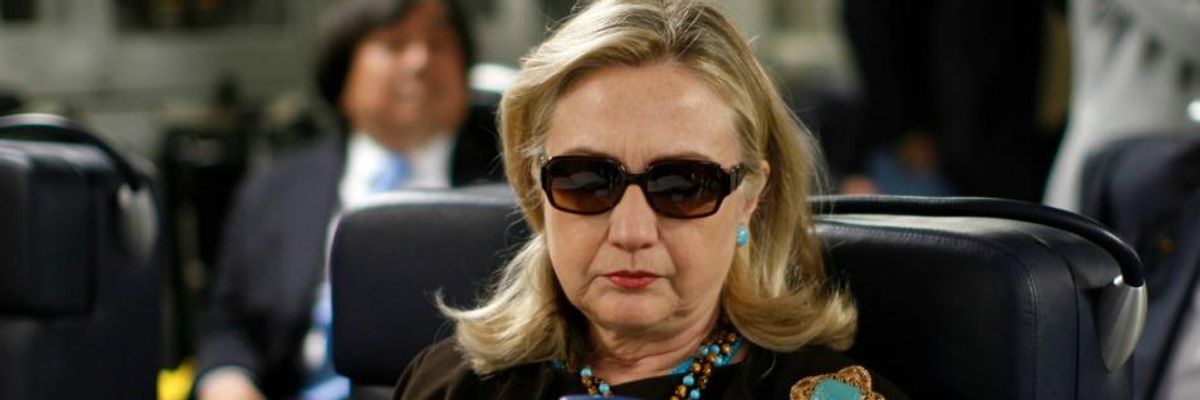A deeper look into this week's revelations surrounding Hillary Clinton's use of a private email account while serving as U.S. Secretary of State suggests that such a breach of protocol allowed the prominent politician and presumed Democratic candidate for president to avoid having her communications accessed by those making records requests, including both members of Congress and journalists filing under the Freedom of Information Act and similar laws.
As the New York Timesreports Wednesday:
Mrs. Clinton's aides on Tuesday sought to play down the significance of her exclusive use of a personal email account for State Department business. But an examination of records requests sent to the department reveals how the practice protected a significant amount of her correspondence from the eyes of investigators and the public.
Mrs. Clinton's exclusive use of personal email for her government business is unusual for a high-level official, archive experts have said. Federal regulations, since 2009, have required that all emails be preserved as part of an agency's record-keeping system. In Mrs. Clinton's case, her emails were kept on her personal account and her staff took no steps to have them preserved as part of State Department record.
According to the Times, the Associated Press is among the news outlets who say they submitted FOIA requests for records related to Mrs. Clinton's tenure at the State Department--dating back to March 2010--but received no answer. The State Department acknowledged on Tuesday that Clinton's private email account "shielded" her communications from being disclosed.
The news and culture site Gawker also reported that Clinton's email setup may explain why FOIA requests submitted by its journalists have gone unanswered or come up empty in recent years.
In response to the latest developments, journalist and political commentator Glenn Greenwald tweeted:
Also published on Wednesday, a separate and deeper investigation by the Associated Press related to Clinton's unorthodox communication practices while heading the State Department revealed that not only did she use a private email account, she also maintained a complex computer system, including a private server for the email account, from her mansion in New York state.
According to AP, "The highly unusual practice of a Cabinet-level official physically running her own email would have given Clinton, the presumptive Democratic presidential candidate, impressive control over limiting access to her message archives. It also would distinguish Clinton's secretive email practices as far more sophisticated than some politicians, including Mitt Romney and Sarah Palin, who were caught conducting official business using free email services operated by Microsoft Corp. and Yahoo Inc."
AP says it has waited more than a year for the State Department to respond to a request under the open records law for emails covering Clinton's tenure as the nation's top diplomat, but noted the agency has never suggested it didn't possess all her emails.
The news agency's reporting continued:
Operating her own server would have afforded Clinton additional legal opportunities to block government or private subpoenas in criminal, administrative or civil cases because her lawyers could object in court before being forced to turn over any emails. And since the Secret Service was guarding Clinton's home, an email server there would have been well protected from theft or a physical hacking.
But homemade email servers are generally not as reliable, secure from hackers or protected from fires or floods as those in commercial data centers. Those professional facilities provide monitoring for viruses or hacking attempts, regulated temperatures, off-site backups, generators in case of power outages, fire-suppression systems and redundant communications lines.
A spokesman for Clinton did not respond to requests seeking comment from the AP on Tuesday. Clinton ignored the issue during a speech Tuesday night at the 30th anniversary gala of EMILY's List, which works to elect Democratic women who support abortion rights.
